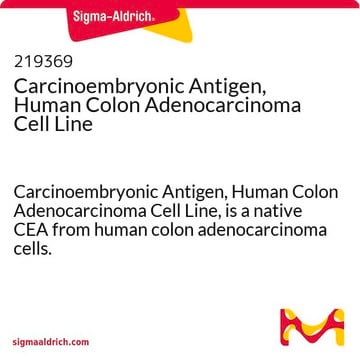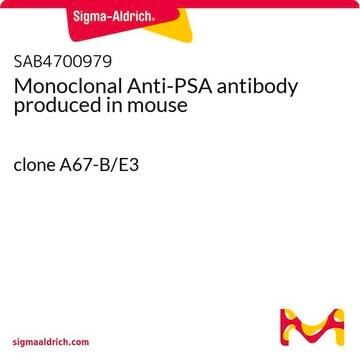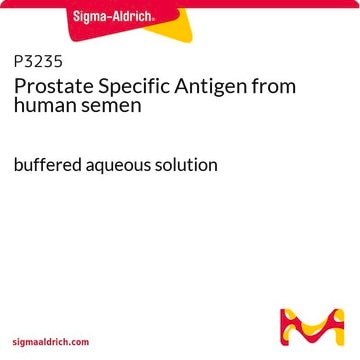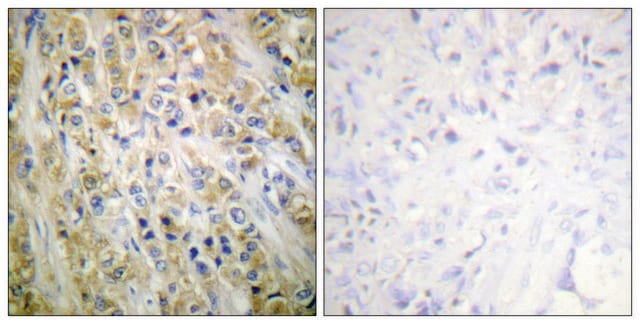C4835
Carcinoembryonic Antigen human
≥95% (SDS-PAGE), buffered aqueous solution
Synonym(e):
Cancer-associated CEA
Anmeldenzur Ansicht organisationsspezifischer und vertraglich vereinbarter Preise
Alle Fotos(1)
About This Item
Empfohlene Produkte
Qualitätsniveau
Assay
≥95% (SDS-PAGE)
Form
buffered aqueous solution
UniProt-Hinterlegungsnummer
Versandbedingung
dry ice
Lagertemp.
−20°C
Angaben zum Gen
human ... CEACAM5(1048)
Allgemeine Beschreibung
Carcinoembryonic antigen(CEA) or CEA cell adhesion molecule 5 (CEACAM5), is encoded by the gene mapped to human chromosome 19q13.2. CEACAM5 is a member of the CEACAM family. This glycosylated protein contains a typical N-terminal variable immunoglobulin (Ig)-like domain, constant Ig-like domain, and a hydrophobic transmembrane domain with a glycosylphosphatidylinositol lipid moiety.
Anwendung
Carcinoembryonic Antigen human has been used as a standard in electrochemical immunosensor and developed surface plasmon resonance imaging (SPRi) immunosensor. It has also been used as a tumor-associated antigen (TAA) in enzyme-linked immunosorbent assay
Biochem./physiol. Wirkung
Carcinoembryonic antigen cell adhesion molecule 5 (CEACAM5) aids in cell adhesion and migration. In addition, this protein inhibits anoikis and thereby promoting tumorigenesis and metastasis. CEACAM5 is used as a biomarker to detect new cancer and cancer recurrence, particularly those with colorectal cancer. Upregulated expression of the gene enhances non-small-cell lung cancer (NSCLC) cell proliferation and invasion by regulating p38–Smad2/3 signaling. Therefore, CEACAM5 might be considered as an effective therapeutic target for treating NSCLC. Overexpression of the gene has also been observed in various types of cancer including gastrointestinal, pancreatic, and breast cancers.
Verpackung
Package size based on protein content
Qualität
Highly purified
Physikalische Form
Solution in 0.15 M phosphate buffered saline, pH 7.4, containing 0.1% sodium azide.
Lagerklassenschlüssel
10 - Combustible liquids
WGK
WGK 1
Flammpunkt (°F)
Not applicable
Flammpunkt (°C)
Not applicable
Analysenzertifikate (COA)
Suchen Sie nach Analysenzertifikate (COA), indem Sie die Lot-/Chargennummer des Produkts eingeben. Lot- und Chargennummern sind auf dem Produktetikett hinter den Wörtern ‘Lot’ oder ‘Batch’ (Lot oder Charge) zu finden.
Besitzen Sie dieses Produkt bereits?
In der Dokumentenbibliothek finden Sie die Dokumentation zu den Produkten, die Sie kürzlich erworben haben.
Kunden haben sich ebenfalls angesehen
Elrasheid A H Kheirelseid et al.
Journal of gastrointestinal oncology, 4(2), 144-157 (2013-06-05)
Despite developments in diagnosis and treatment, 20% of colorectal cancer (CRC) patients present with metastatic disease and 30% of cases recur after curative surgery. Furthermore, the molecular factors involved in prognosis and response to therapy in CRC is poorly understood.
Xinwen Zhang et al.
The Journal of international medical research, 48(9), 300060520959478-300060520959478 (2020-10-01)
To detect the expression of CEA-related cell adhesion molecule 5 (CEACAM5) in non-small-cell lung cancer (NSCLC) and explore its function in the progression and development of NSCLC. qRT-PCR and immunohistochemistry were performed to detect CEACAM5 expression in human NSCLC tissues
Go, V.L.W.
Cancer, 38, 562-562 (1976)
Beata Szymanska et al.
Analytical biochemistry, 609, 113964-113964 (2020-09-27)
Carcinoembryonic antigen (CEA) is one of the biomarkers most commonly used to determine tumor activity. In this work, a Surface Plasmon Resonance imaging (SPRi) immunosensor was developed. The immunosensor consists of a cysteamine linker attached to a gold chip and
Yingji Jin et al.
Oncotarget, 8(62), 105425-105439 (2017-12-30)
Serum autoantibodies against tumor-associated antigens (TAAs) have received much attention as potential biomarkers for early detection of cancers, since they can be detected in the early stages of cancers. Autoantibodies against Cancer Antigen 15-3 (CA15-3), carcinoembryonic antigen (CEA), Cancer Antigen
Unser Team von Wissenschaftlern verfügt über Erfahrung in allen Forschungsbereichen einschließlich Life Science, Materialwissenschaften, chemischer Synthese, Chromatographie, Analytik und vielen mehr..
Setzen Sie sich mit dem technischen Dienst in Verbindung.









